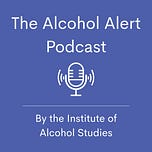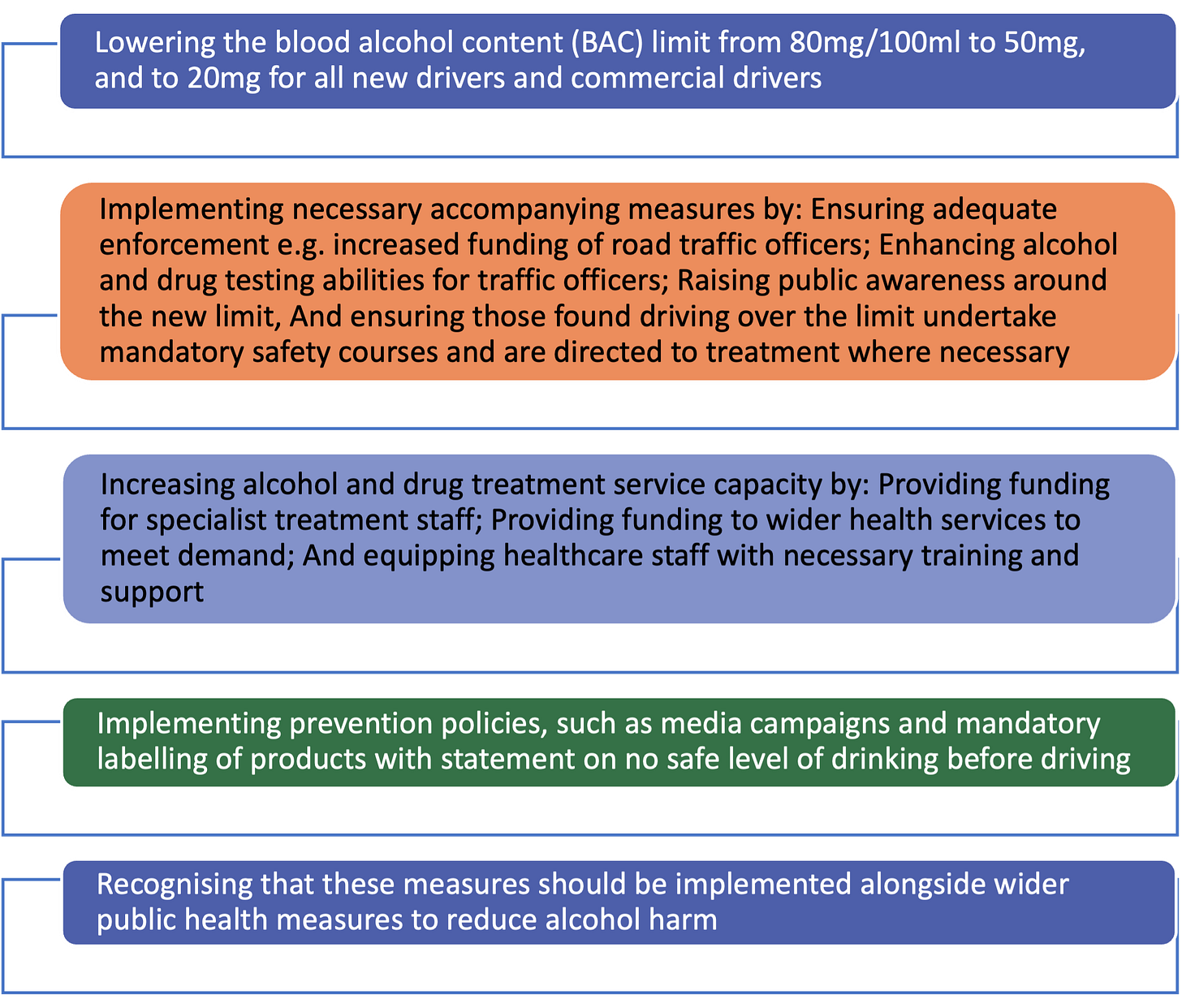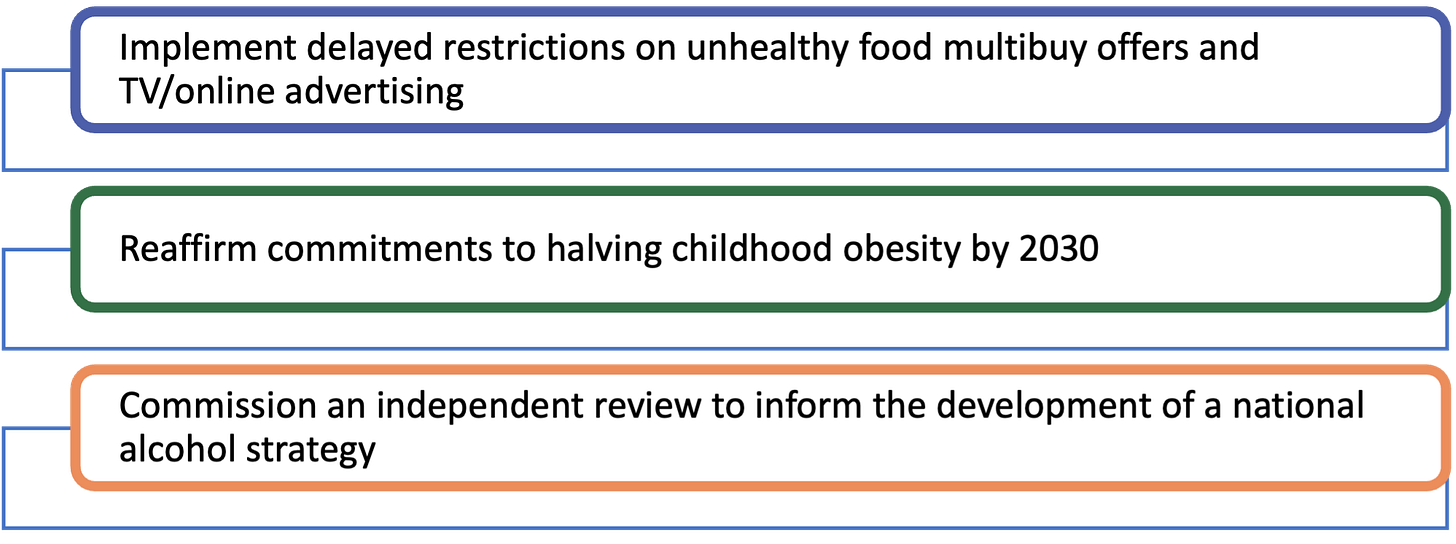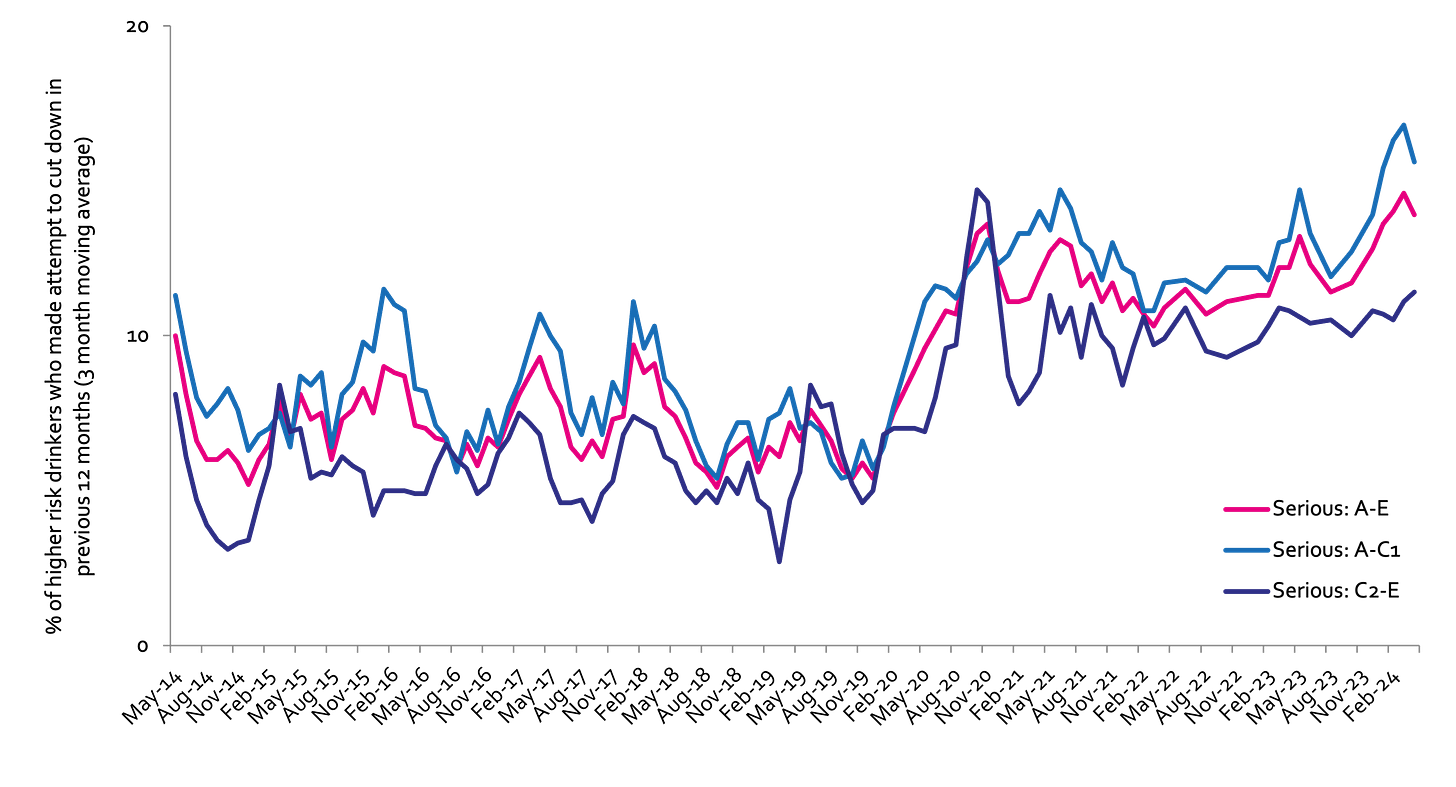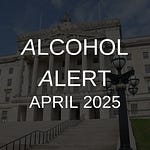Hello and welcome to the Alcohol Alert, brought to you by The Institute of Alcohol Studies.
In this edition:
IAS blogs
What have the main political parties said about alcohol in their manifestos?
BMA calls for reduction in drink driving limit 🎵 podcast feature 🎵
Finland and Sweden to relax laws restricting alcohol’s availability
WHO status report shows huge rates of alcohol harm across the globe
Preventing cancer cases must be a priority of the next government, says WCRF
Promises to improve the nation’s health need to be acted on this time
Removing the positive social context from alcohol adverts reduces alcohol’s attractiveness
Alcohol Toolkit Study: update
We hope you enjoy our roundup of stories below: please feel free to share. Thank you.
IAS blogs
To read blogs click here.
What have the main political parties said about alcohol in their manifestos?
With the UK General Election being held next week, we’ve looked through party manifestos to see what they have promised regarding public health, hospitality, and the alcohol industry. None of the manifestos specifically mention alcohol within a public health context. There is focus on tobacco, vaping, unhealthy foods, and illicit drug use.
Conservatives
Regarding public health, the party states it will bring forward the Tobacco and Vapes Bill in their first King’s Speech. They will also restrict advertising of HFSS products and gather new evidence on ultra-processed foods.
To support hospitality, the Conservatives state that they will maintain the draught duty relief, so on-trade alcohol has reduced duty rates to the off-trade. The party also promises to strengthen communities by extending its Community Ownership Fund, to help communities take control of assets such as pubs and music venues. Their manifesto also includes a pledge to launch a review of the nighttime economy, to see how to reverse the decline in pubs and clubs.
Labour
The Labour manifesto highlights the importance of prevention. It states that to tackle the biggest killers and support people to live healthier lives, the party would “ensure the next generation can never legally buy cigarettes”. It would also ban vapes being branded and advertised to appeal to children, ban junk food advertising to children, and work with the gambling industry to “ensure responsible gambling”. It concludes that it will halve the gap in life expectancy between the richest and poorest English regions by tackling social determinants of health.
It does not mention alcohol policy to support hospitality or the alcohol industry.
Liberal Democrats
The Liberal Democrats’ manifesto pledges to increase the public health grant as well as establishing a ‘Health Creation Unit’ in the Cabinet Office to lead work across government to improve the nation’s health. It plans to ban single-use vapes and introduce a levy on tobacco company profits to fund cessation services. Regarding unhealthy food, the party promises to support local authorities to restrict outdoor marketing and restrict TV advertising to post-watershed, as well as extending the soft drinks levy to juice- and milk-based products high in sugar.
The party also focuses on harm caused by drugs (apart from alcohol), promising to invest more in addiction services, introduce a legal and regulated market for cannabis, free up police time by diverting people arrested for possession for personal use into treatment, tackle criminal gangs, and treat Scotland’s drug deaths crisis as a public health emergency.
It says it will enhance powers over community assets to help local authorities protect pubs.
SNP
The SNP manifesto doesn’t mention support for the industry, but focuses on tackling drug deaths by decriminalising drugs for personal use. It also pledges to reintroduce UK-wide legislation to create a smoke-free generation, ban single-use vapes, and encourage the UK government to urgently bring forward the gambling levy.
Plaid Cymru
The party states that a preventative public health strategy which rebalances resources would help the NHS by preventing patients entering the system earlier than necessary.
They also promise to support local communities such as pubs.
Green
The Green Party states it will increase NHS funding by £8 billion in the first year, and invest in capital spending to build and repair hospitals. They also state that investing in public health is key to prevention and will push for restoring the public health budgets to 2015/16 levels, as well as establishing a National Commission to agree reform of the UK’s drug laws.
Reform
Their manifesto does not mention support for the industry. It promises clear labelling for consumer choice, restrictions on children’s social media use, and cancelling membership of the World Health Organization (WHO), as well as rejection of the WHO’s Pandemic Treaty, unless there is fundamental reform to its structure and funding.
BMA calls for reduction in drink driving limit 🎵 podcast feature 🎵
On 21 June, the British Medical Association (BMA) launched a consensus statement setting out key actions that are needed to reduce the harms from driving under the influence of alcohol and other drugs. The statement was in collaboration with organisations representing medical professional bodies, alcohol and road safety charities and campaign groups, police and emergency services, and others.
The statement, which was backed by IAS and the Alcohol Health Alliance (AHA), calls for:
Professor Sir Ian Gilmore – President of the BMA and Chair of the AHA – wrote in an accompanying blog that:
“Countries that have taken steps to reduce the levels of drink and drug driving, including through reducing the blood alcohol limit for driving, have seen improvements in the rate of road traffic collisions and fatalities caused by driving under the influence. Hundreds of lives could be saved by taking action to stop drink and drug driving and implementing all necessary policy measures before the problem worsens.
“With a General Election imminent, we have a real opportunity to push the next UK Government and the Devolved Administrations to take action to save lives. With the British Medical Association leading and the support of the Alcohol Health Alliance, surely the shameful position of the UK in having the highest drink-driving limit in Europe can be put right.”
IAS’s Chair Dr Peter Rice spoke to Mike Graham on TalkTV about how alcohol impairs judgement as well as reaction time, why the BMA calls don’t go as far as a zero-tolerance policy, and why people need to believe there’s a risk of being caught and sanctioned for the policy to work.
On our podcast this month we spoke to Sir Ian and Suzanne Wood, Head of Population Health at the BMA. We discussed the detail of the statement, why Scotland did not see a reduction in traffic collisions following their lowering of the limit to 50mg, and Sir Ian reflected on his time as President of the BMA, which comes to an end this week.
Finland and Sweden to relax laws restricting alcohol’s availability
Finland and Sweden both have state monopolies over the sale of alcohol, meaning that most alcohol is sold via state-owned organisations. One of the intentions of monopolies is to remove the profit maximisation incentive from selling alcohol and put public health first.
However, both countries are moving to relax availability laws. Finland’s parliament has approved the sale of fermented drinks – so beer, cider, and wine, but not spirits – with an alcohol content up to 8% in supermarkets. The current limit is 5%.
In Sweden, the government plans to allow “farm sales”, meaning alcohol producers can sell products directly to visiting customers. Ministers have said that it will help create “great memories”.
The BBC states that both decisions may need referring to the European Commission to check there is no breach of competition law and that: “The Commission has already voiced objections to Finland's decision to exclude distilled beverages from its new law.”
In April 2022, the Finnish Institute for Health and Welfare (THL) published research that stated the monopoly system “should be preserved” on public health grounds. They argued that the system limited alcohol’s availability, and reined in price competition, marketing and other promotional activities, thereby reducing consumption and harm.
THL’s Chief Specialist Thomas Karlsson said:
“Increasing the availability of stronger alcoholic beverages gradually undermines the foundation of the national alcohol policy, and also the favourable trend in overall alcohol consumption."
Alcohol consumption fell in Finland by 2.4% from 2022-2023, and has been on a downward trend since 2007.
WHO status report shows huge rates of alcohol harm across the globe
The World Health Organization published its global status report on alcohol on 25 June, which provides an update based on 2019 data on the public health impact of alcohol and other drug use worldwide.
It shows that around 400 million people live with alcohol use disorders globally – 7% of the world’s population aged 15 years and older – 209 million of whom have alcohol dependence.
Dr Tedros Adhanom Ghebreyesus, WHO Director-General, said:
"To build a healthier, more equitable society, we must urgently commit to bold actions that reduce the negative health and social consequences of alcohol consumption and make treatment for substance use disorders accessible and affordable."
The highest deaths from alcohol were in the Europe and Africa regions. Europe has the highest alcohol consumption per person, however Africa’s is comparatively low, yet the region experiences very high levels of harm. The cause of death in each region varied substantially, with cardiovascular disease dominating in Europe, compared to infectious diseases in Africa.
Of all deaths attributable to alcohol in 2019 – approximately 2.6 million – an estimated 1.6 million deaths were from noncommunicable diseases, including 474,000 deaths from cardiovascular diseases and 401,000 from cancer. Around 724,000 deaths were due to injuries, such as those from traffic crashes, self-harm and interpersonal violence. Another 284,000 deaths were linked to communicable diseases.
The highest proportion (13%) of alcohol-attributable deaths in 2019 were among young people aged 20–39 years.
The report concludes that:
“Commitment must now lead to rigorous implementation of the Global alcohol action plan 2022–2030, with increased advocacy leading to reduced alcohol consumption, stronger prevention and treatment capacity of health and social care systems and accelerated training of health professionals.
“We set our sights on longer and healthier lives for people throughout the world, and greater chances of success in meeting not only the SDG health target 3.5 but all of the Sustainable Development Goals.”
Preventing cancer cases must be a priority of the next government, says WCRF
The next UK government must prioritise cancer prevention, states the manifesto of the World Cancer Research Fund (WCRF).
Almost 40% of cancer cases are preventable by addressing key risk factors such as alcohol consumption, poor diets, obesity, and low physical activity levels, alongside socio-economic disparities and funding shortages.
The charity outlines the top three priorities for the first 100 days of the new government:
The manifesto includes additional measures to reduce alcohol harm including:
Classify alcohol as an ‘unhealthy product’ under the HFSS marketing restrictions.
Introduce mandatory labelling, including risks associated with cancer.
Implement and review a minimum unit price on alcohol in England and Northern Ireland.
Ensure alcohol duty is kept in line with inflation and stronger products continue to be taxed at higher rates.
The shocking rise in early cancer cases
In related news, cancer diagnoses in Brits under 50 have risen by 24% over the past 20 years, driven by alcohol use, inactivity, and poor diets.
Early onset cancer rates increased from 132.9 per 100,000 people in 1995 to 164.6 in 2019, with around 35,000 young people diagnosed annually.
While cancer rates have risen across all age groups, the increase among the under-50s is significantly higher.
Promises to improve the nation’s health need to be acted on this time
In early June, The Health Foundation published its own prevention report, which called on the next government to “set a goal to improve the nation’s health - this needs to be a key driver of government policy over the next decade and beyond”.
To achieve this, the charity said the government needs to adopt a prevention-led approach that is aligned across government with clear accountability, led by the highest office, with shifts to long-term investment by recognising the economic benefit of reducing harm.
The charity states that the next government must introduce evidence-based policies that prevent the early onset of ill health and slow the progress of health conditions. One of the policy areas they call on is to “apply population-level approaches to leading risk factors of avoidable ill health including smoking, alcohol use, diet and physical inactivity”.
Highlighting the economic cost of reduced productivity from alcohol harm, and wider costs, The Health Foundation argues that:
“Promised bold action on the leading risk factors for ill health, including unhealthy foods, tobacco and alcohol have been delayed or rejected. Enacted policies have focused on individual responsibility rather than more proven population-level policies aimed at creating the conditions that enable everyone to be healthy.”
The policies called for in the report relating to alcohol are:
“Good health is key for a thriving and prosperous UK, so this time it needs to be different. There is an urgent need for a new government to act on the UK’s worsening and increasingly unequal health. This will require a comprehensive prevention-led approach to action across the broad range of factors that influence health and drive inequalities.”
Removing the positive social context from alcohol adverts reduces alcohol’s attractiveness
A study in the journal Alcohol: Clinical and Experimental Research looked at the impact of removing positive social context from alcohol adverts and including health warnings among UK adults.
Using an online experiment with 2,421 participants, the study compared adverts featuring positive social interactions with those without such imagery, alongside either multiple text health warnings or a "drink responsibly" message.
Results showed that removing positive context and adding health warnings reduced the attractiveness, product appeal, trial intentions, and enjoyment perception of the adverts, while increasing perceived harm.
The authors write that:
“That the presence or absence of positive social context influenced consumer reactions reinforces the persuasive role such connotations play in alcohol marketing communications and demonstrates the utility of content controls in limiting this.
“Consistent with existing literature, the multiple text health warning both limited the persuasive appeal of the advert and increased perceived health harm. That the warnings had a greater impact than the “drink responsibly” message is consistent with literature which has questioned the efficacy of such industry-favoured framing.”
Alcohol Toolkit Study: update
The monthly data collected is from English households and began in March 2014. Each month involves a new representative sample of approximately 1,700 adults aged 16 and over.
See more data on the project website here.
Prevalence of increasing and higher risk drinking (AUDIT-C)
Increasing and higher risk drinking defined as those scoring >4 AUDIT-C. A-C1: Professional to clerical occupation C2-E: Manual occupation
Currently trying to restrict consumption
A-C1: Professional to clerical occupation C2-E: Manual occupation; Question: Are you currently trying to restrict your alcohol consumption e.g. by drinking less, choosing lower strength alcohol or using smaller glasses? Are you currently trying to restrict your alcohol consumption e.g. by drinking less, choosing lower strength alcohol or using smaller glasses?
Serious past-year attempts to cut down or stop
Question 1: How many attempts to restrict your alcohol consumption have you made in the last 12 months (e.g. by drinking less, choosing lower strength alcohol or using smaller glasses)? Please include all attempts you have made in the last 12 months, whether or not they were successful, AND any attempt that you are currently making. Q2: During your most recent attempt to restrict your alcohol consumption, was it a serious attempt to cut down on your drinking permanently? A-C1: Professional to clerical occupation C2-E: Manual occupation
The UK Alcohol Alert (incorporating Alliance News) is designed and produced by The Institute of Alcohol Studies. Please click the image below to visit our website and find out more about us and what we do, or the ‘Contact us’ button. Thank you.


